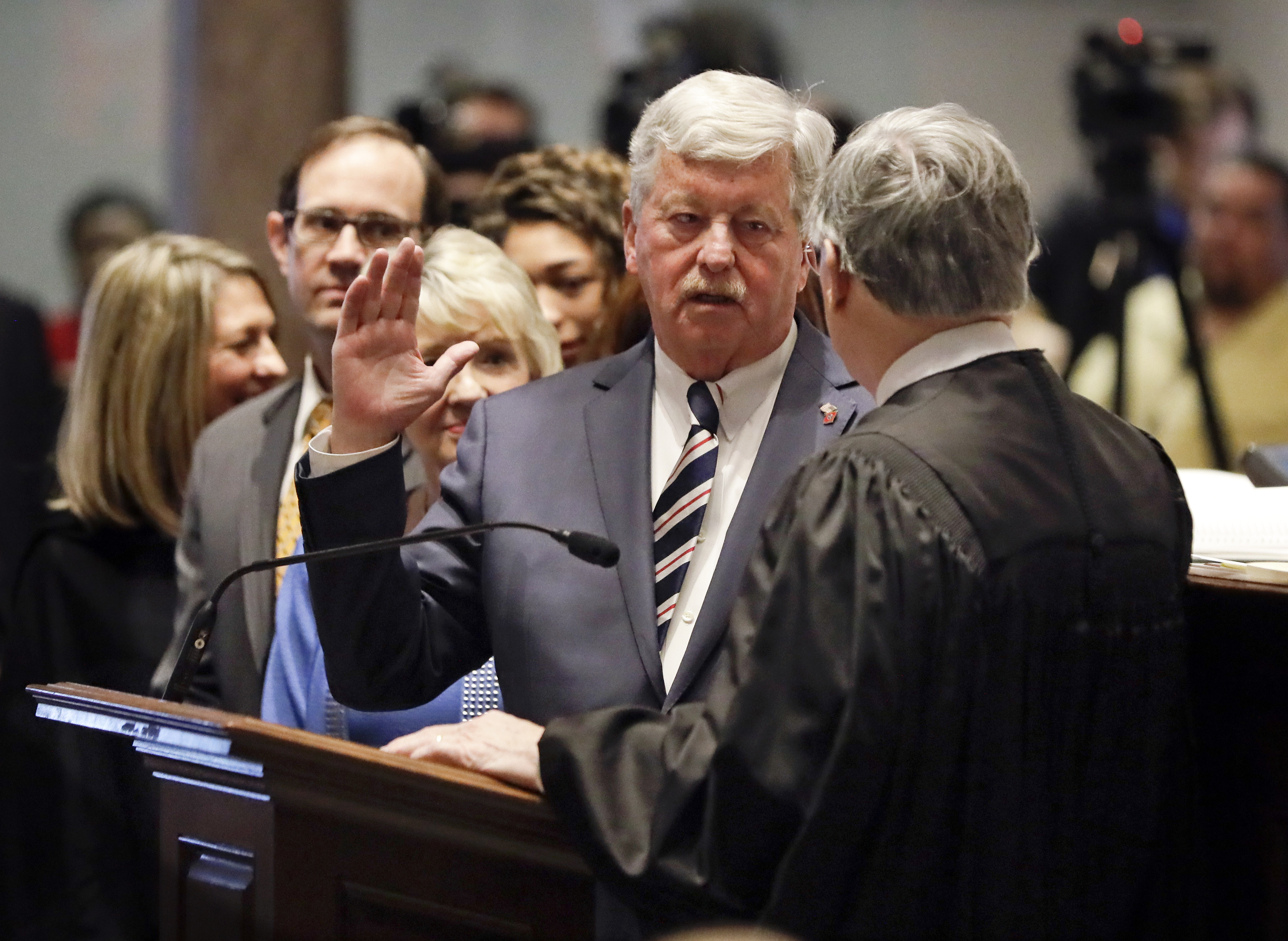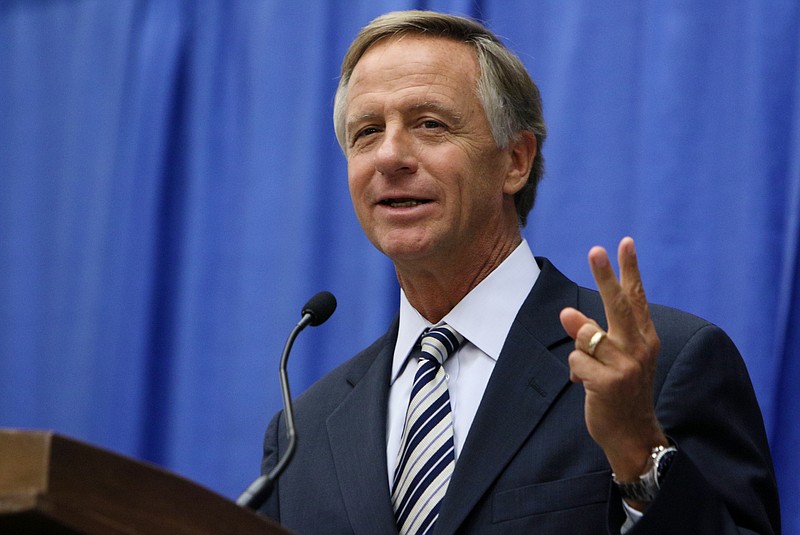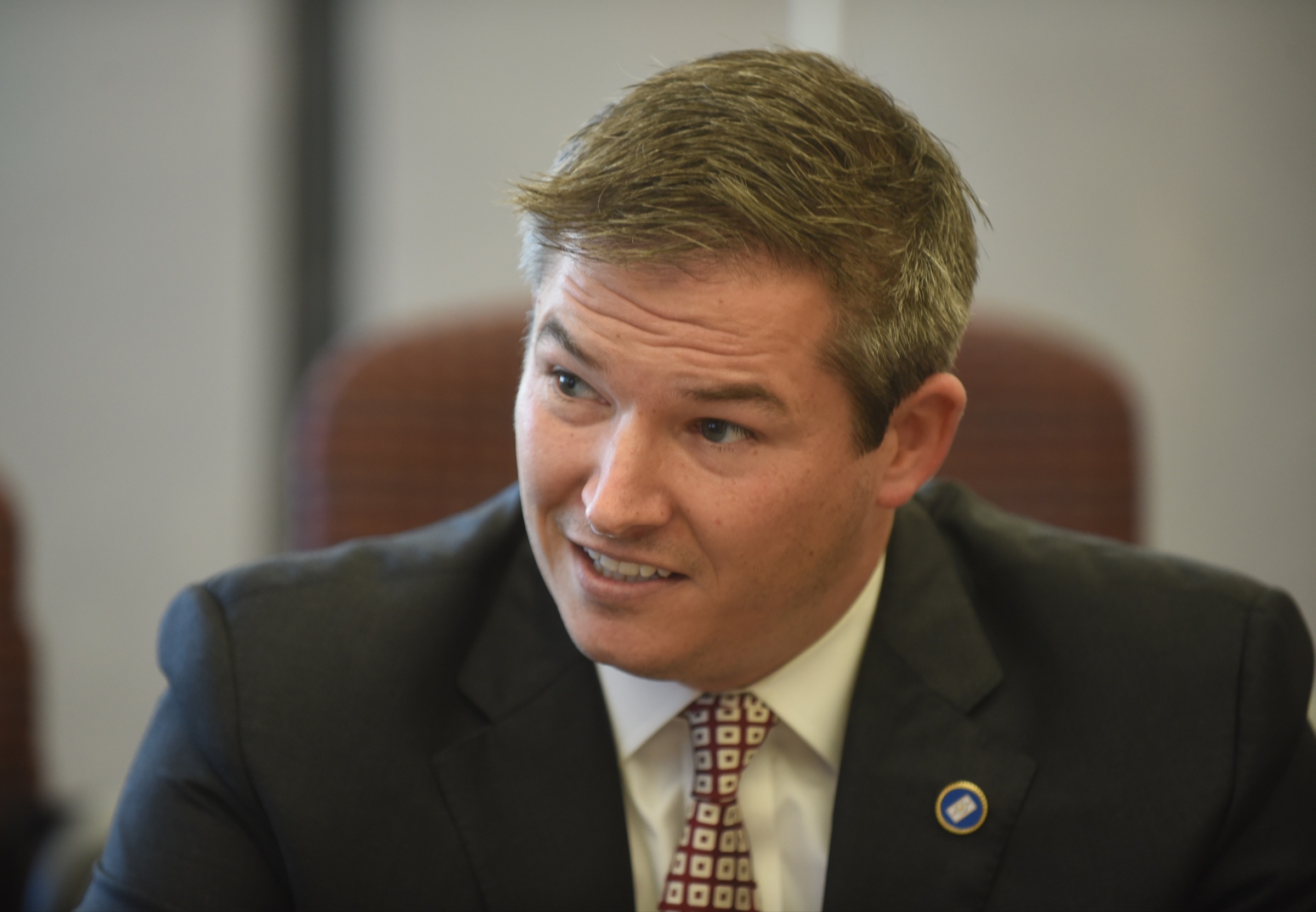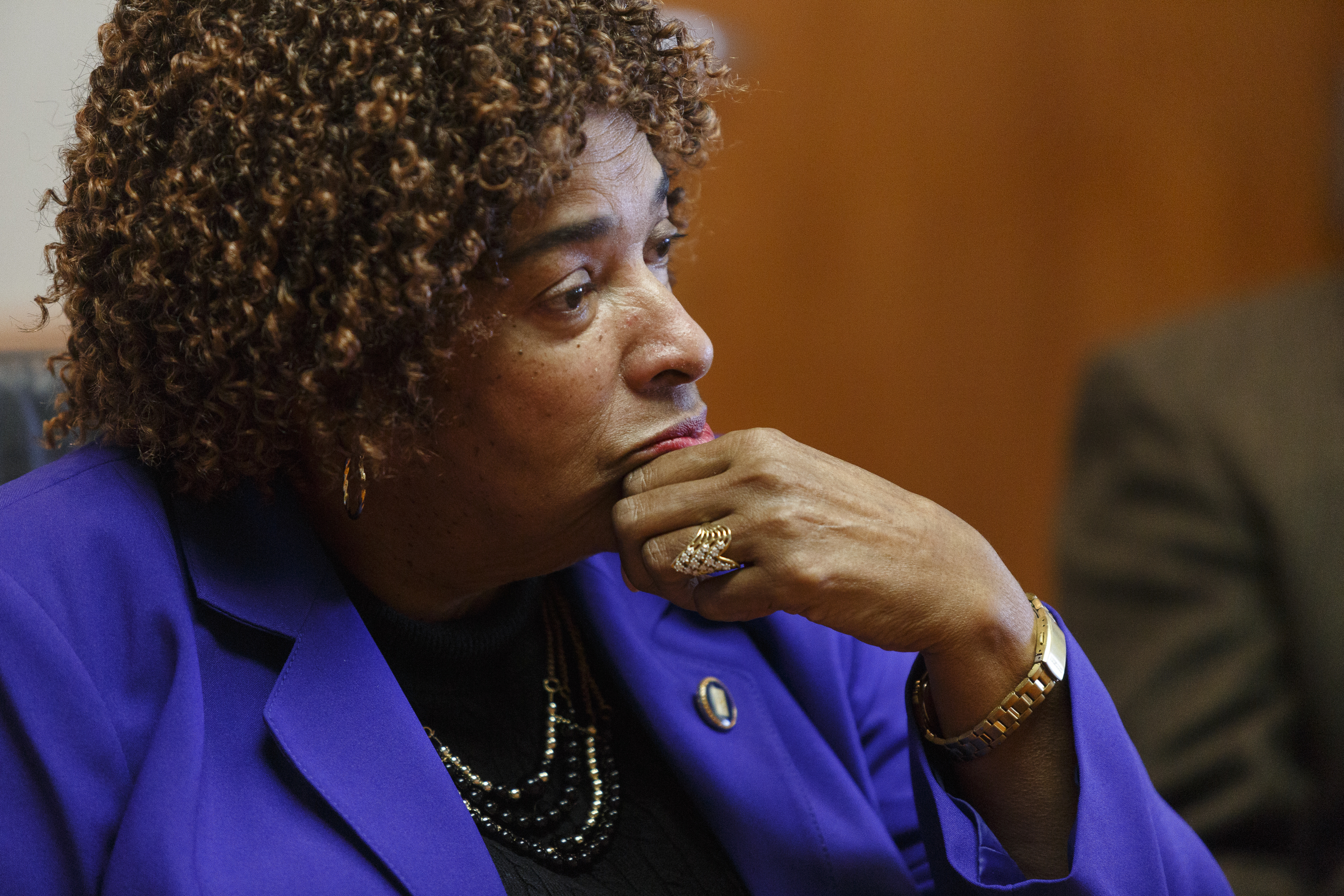NASHVILLE - Republican Lt. Gov. Randy McNally predicted Thursday that Gov. Bill Haslam's proposed "TN Together" plan to address the state's opioid crisis will have broad backing among state lawmakers, but legislative Democrats continue to charge the proposal falls well short of the mark.
"The governor, I think, will receive wide support from the Legislature," McNally, the Senate speaker, told reporters during top GOP Senate leaders' weekly news conference.
McNally noted the $30 million proposal relies on law enforcement and interdictions, treatment and education, not just for the public but for physicians on prescribing patterns, along with limits on initial prescriptions on painkillers.
 Senator Randy McNally, R-Oak Ridge, center, is sworn in as Senate Speaker by former Tennessee Supreme Court Justice William Koch Tuesday, Jan. 10, 2017, in Nashville, Tenn. McNally succeeds Sen. Ron Ramsey, R-Blountville, who did not seek re-election. Lawmakers convened for the 110th Tennessee General Assembly with new leadership in the Senate and a House speaker eying a gubernatorial bid. (AP Photo/Mark Humphrey)
Senator Randy McNally, R-Oak Ridge, center, is sworn in as Senate Speaker by former Tennessee Supreme Court Justice William Koch Tuesday, Jan. 10, 2017, in Nashville, Tenn. McNally succeeds Sen. Ron Ramsey, R-Blountville, who did not seek re-election. Lawmakers convened for the 110th Tennessee General Assembly with new leadership in the Senate and a House speaker eying a gubernatorial bid. (AP Photo/Mark Humphrey)Earlier, Senate Democratic Caucus Chairman Jeff Yarbro, joined by fellow minority Senate and House Democrats, argued the plan falls short of what's needed to address the epidemic.
"Nobody's angry because we're proposing spending too much money on treatment, because we're not," Yarbro said. "Nobody in law enforcement has said, 'We're changing the stigma from one of a disorder and a health problem that needs to be treated,' because we're not."
Nor is anyone complaining "that we're holding the drug companies that are responsible for this drug epidemic too accountable because we're not," Yarbro added, calling it "unacceptable" in a state with one of the highest opioid prescription rates nationally, with annual overdose deaths exceeding traffic fatalities.
Rep. JoAnne Favors, D-Chattanooga, a retired nurse and health facilities executive, said she believes Haslam's proposal is a good start, but there remain areas that need to be addressed.
For example, in addition to revising physician training at state universities on painkiller prescribing, the governor's plan proposes a five-day limit on opioid prescriptions for new patients, an issue that has the Tennessee Medical Association, which represents doctors, concerned.
"The physician must have a major voice in developing any guidelines," Favors said.
The Tennessee Medical Association this week raised concerns about aspects of Haslam's plan with association president Dr. Nita W. Shumaker, saying physicians have already taken a number of steps, abiding by the federal Centers for Disease Control and Prevention's prescribing guidelines.
"We do need to reduce supply and dosage, particularly for new patients and acute episodes like the hospital ER," Shumaker said in her statement. "At the same time, we want to make sure that any law(s) limiting physicians' ability to prescribe have reasonable exceptions to continue giving relief to patients in legitimate need, such as chronic pain, oncology or hospice patients."
She called for insurance companies to do their part by changing their reimbursement policies to better cover costs for alternative pain treatments like physical therapy.
In a statement to the Times Free Press, Tennessee Medical Association Vice President Dave Chaney said, "It's fair to say that physicians may have pause over a law that limits their medical discretion, vs. guidelines that help them follow best medical practices."
He said his association has for years pushed safer and more appropriate prescribing, "and for the past 1-2 years in particular, has encouraged providers to reduce supply and dosage to 3-5 days, especially for acute episodes and new patients. But as Dr. Shumaker said ... there are some cases where opioids are necessary and effective as part of a treatment plan."
Joining Republican leaders' discussion of Haslam's bill on Thursday was Sen. Steve Dickerson, R-Nashville, a physician.
Regarding Democrats' charges the governor isn't being bold enough, Dickerson said, "Will it solve every opiate addiction problem? Obviously not. That's not a realistic expectation. ... It's going to make progress, and I'm sure next year we'll be sitting at this table with a new governor and coming up with the 2.0 version of this. So I think it's a great start."
McNally, a retired pharmacist, said he is open to discussing the five-day opioid prescription limit for new patients. It wouldn't apply to patients already receiving the prescriptions.
He also said he backs alternative pain treatments like physical therapy and acupuncture and agreed with Dickerson's assertion that insurance companies don't like to pay for these alternative therapies.
"It's easier for the insurance companies to approve a prescription for Lortab or Vicodin rather than a prescription for physical therapy or acupuncture or a number of other modalities," McNally said.
Dickerson, an anesthesiologist, noted that his work often puts him on the "forefront of pain" issues.
As the state seeks the "exact right answer" to its opioid problems, Dickerson said, "part of the beauty of this [process] is the governor proposes it, the General Assembly gets at it and during the amendatory process we might tweak it a little bit."
Meanwhile, Dickerson is the Senate sponsor of a bill that would legalize tightly controlled medical cannabis oil-based products for use by patients with diagnosed problems ranging from cancer and HIV-AIDS to arthritis and epilepsy as well as other diseases.
Asked if that might help with the opioid crisis, Dickerson glanced at McNally and Senate Speaker Pro Tem Ferrell Haile, R-Gallatin, another retired pharmacist, both of whom oppose the legislation.
"I do believe that's the case," he said. "I would say I'm in the minority on this side of the table to advocate for that, maybe the sole voice that would advocate for that."
Senate Republican Caucus Chairman Bill Ketron of Murfreesboro noted he used to be outright opposed to medical marijuana but has reconsidered that after undergoing treatment for cancer.
Ketron said while he never used any medical cannabis, he now sees how it might have been helpful in controlling pain and nausea. As a result, he said he will consider supporting Dickerson's bill.
Contact staff writer Sher at asher@timesfreepress.com or 615-255-0550. Follow him on Twitter @AndySher1.


